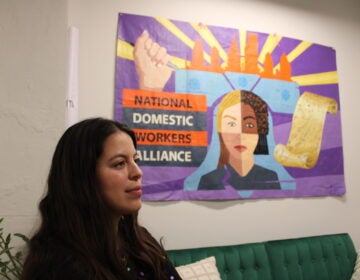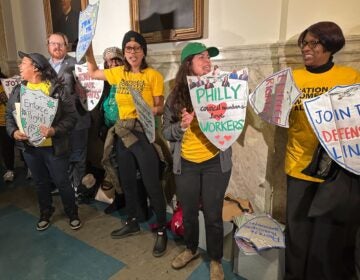Philly workers ask City Council to pledge support for labor protections on the first day of the new term
The action comes ahead of anti-retaliation legislation expected to be introduced by prime sponsor Councilmember Kendra Brooks this term.
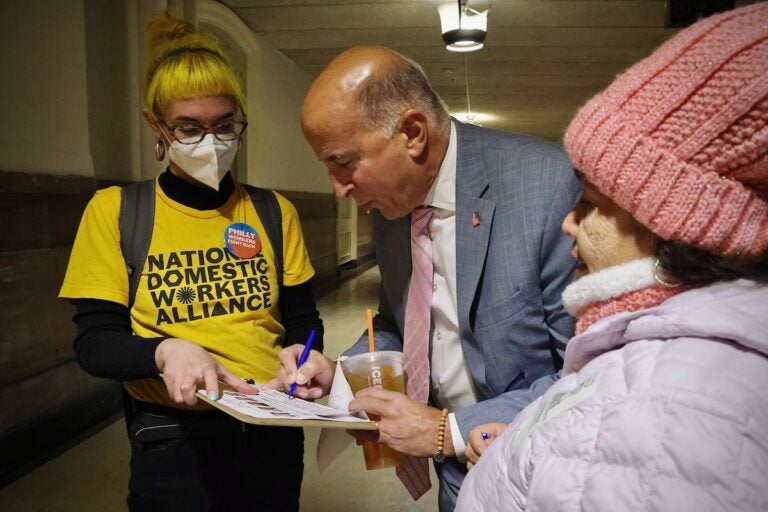
Members of Pennsylvania chapter of the National Domestic Workers Alliance get a signature from Philadelphia City Councilmember Mark Squilla as they canvas City Hall looking for support. (Emma Lee/WHYY)
From Philly and the Pa. suburbs to South Jersey and Delaware, what would you like WHYY News to cover? Let us know!
Philly workers turned out on the first day of Philadelphia City Council’s new term, pushing for workers’ rights to be at the top of the legislative agenda this year.
Forty-five workers spoke one-on-one with City Council members Thursday morning, asking legislators to sign a pledge to fight for workers’ rights in 2024.
The action — led by the Pennsylvania chapter of the National Domestic Workers Alliance (NDWA), Philly Black Worker Project, Community Legal Services, Hand in Hand: The Domestic Employers Network, Juntos, VietLead and other advocacy organizations — comes ahead of anti-retaliation legislation expected to be introduced by prime sponsor Councilmember Kendra Brooks this term.
Guadalupe Canchola, a domestic worker and organizer with Pa. NDWA since 2018, said workers’ goal with the new legislation and continued advocacy is to strengthen the protections that the Philadelphie Domestic Worker Bill of Rights first established when it was passed in 2019.
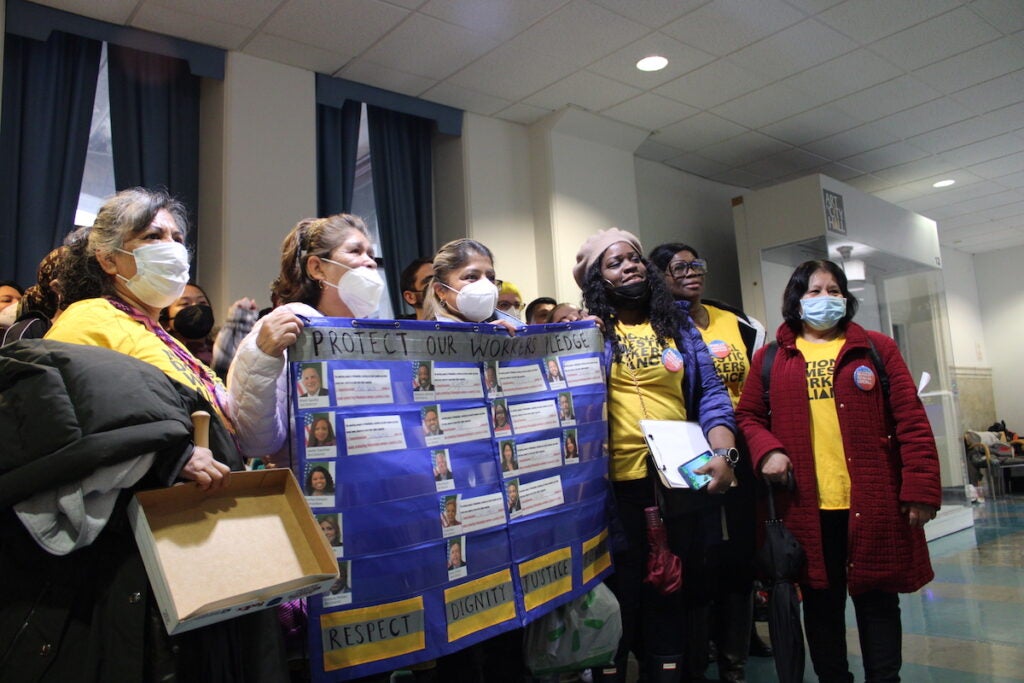
Canchola said some employers are sometimes “aggressive” with domestic workers and refuse to pay them and steal their wages. Many of the estimated 16,000 domestic workers in Philadelphia are women and immigrants, making them vulnerable to threats of retaliation based on immigration status.
“Queremos que la alcaldía tome cartas en el asunto y que nos dé realmente un respaldo porque lo necesitamos para seguir luchando”, dijo Canchola.
“We want City Hall to take action on the matter and really give us support because we need it to keep fighting,” Canchola said.
Canchola later approached Councilmember Mark Squilla in the hallway outside of City Council chambers, asking him to sign the pledge to protect workers, which reads: “The working people in Philadelphia, including my family members and other loved ones, deserve to have their rights respected. I, Councilmember [space], pledge to make protecting Philadelphia workers a priority in 2024.”
Councilmember Squilla responded, “You have my support,” while signing the pledge.
Councilmembers Cindy Bass, Jamie Gauthier, Kenyatta Johnson, Curtis Jones Jr., Isaiah Thomas, Rue Landau, Nicolas O’Rourke and Jeffery Jay Jr. also signed the pledge on Thursday. Councilmember Kendra Brooks did not sign in person but has expressed her support, and is the prime sponsor of the expected anti-retaliation legislation.
Nicole Kligerman, director of the Pa. NDWA, said the pledges are a first step in strengthening worker protections throughout the city.
“I think it was powerful, domestic workers and other kinds of workers from across the city showed out in very full force to the first day of council … I think we really made our presence known, showing up by the dozens into this space to demand that 2024 is the year for real change for low wage workers in our city,” Kligerman said.
According to Kligerman, the anti-retaliation legislation, designed to strengthen existing labor protections, is “almost completed,” but the timing will depend on upcoming budget discussions, which will start in March and run through June.
“We’re also fighting hard for a fully-funded budget for the Office of Worker Protections. We need at least $2.5 million to go exclusively to that office within the Department of Labor, not the full Department of Labor budget, but just the Office of Worker Protections, which oversees the implementation of all of our labor ordinances. So the timing of the legislation hinges a bit on the budget, but we look forward to winning both of those things this year,” she said.
In 2023, the city’s Office of Worker Protections doubled the amount of money it recovered on behalf of employees from the year before and has grown since being established as a permanent office in 2020. With more workers filing complaints, Kligerman and other organizers argue the office should receive increased funding in order to hire more investigators.
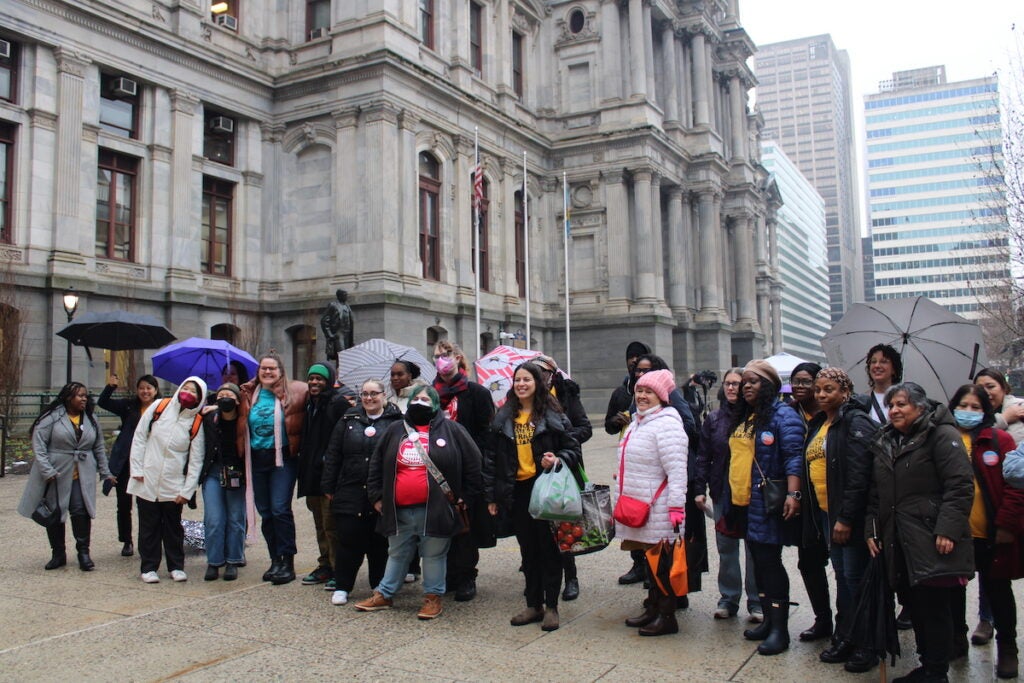
Amy Cohen, deputy director of Hand in Hand: The Domestic Employers Network, was at City Hall on Thursday to support workers. Cohen said that strong labor protections benefit both domestic employers and workers.
“Employers really benefit when there are laws on the books that help to show them what to do, and many employers want to do the right thing by the domestic workers who are working for them. And so when there are strong laws that protect the rights and dignity of domestic workers, it’s easier for employers to know how to do that,” Cohen said.
Catherine Fortune De Sormeaux, a domestic worker and Pa. NDWA member, said showing up in legislative chambers is necessary.
“If we don’t come to sessions like this, everything will remain standard,” De Sormeaux said.
De Sormeaux said that conditions for domestic workers have improved since the Bill of Rights was passed, but “we still need … a better, a stronger foundation.”
“We cannot do it alone. We, the leaders and members of the group, we cannot do it alone. We need people on top and management positions, the politicians … and the heads of government, they need to assist, and with that, we will be able to get a better-standing ground for the workers in Philadelphia.”

Get daily updates from WHYY News!
WHYY is your source for fact-based, in-depth journalism and information. As a nonprofit organization, we rely on financial support from readers like you. Please give today.



